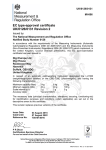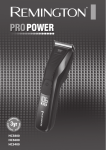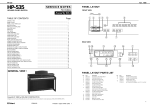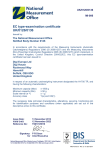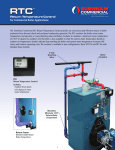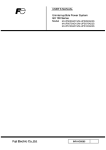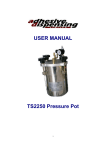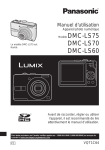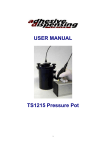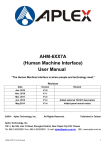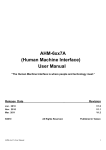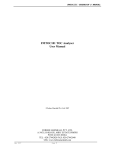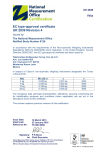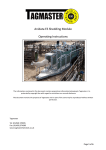Download EC type-approval certificate UK 2930 Revision 4
Transcript
UK 2930 V(0)a EC type-approval certificate UK 2930 Revision 4 Issued by: The National Measurement and Regulation Office Notified Body Number 0126 In accordance with the requirements of the Non-automatic Weighing Instruments Regulations 2000 (SI 2000/3236) which implement, in the United Kingdom, Council Directive 2009/23/EC, this EC type-approval certificate has been issued to: Digi Europe Ltd Digi House Rookwood Way Haverhill Suffolk, CB9 8DG United Kingdom In respect of a Class III non-automatic weighing instrument designated the LI-700E (weight/weight-price labeller) and having the following characteristics: Maximum capacity (Max) Minimum capacity (Min) Scale interval (e =) 3 kg 40 g 2g 6 kg 40 g 2g 10 kg 100 g 5g The necessary data (principal characteristics, alterations, securing, functioning etc) for identification purposes and conditions (when applicable) are set out in the descriptive annex to this certificate. This revision replaces previous versions of the certificate. Issue Date: Valid Until: Reference No: 03 September 2015 07 August 2022 TS1201/0044 GStones Technical Manager - Certification Services For and on behalf of the Chief Executive 0135 National Measurement & Regulation Office I Stanton Avenue I Teddington I TW11OJZ I United Kingdom Tel +44 (0) 20 8943 7272 I Fax +44 (0) 20 8943 7270 I Web www.gov.uk/nmro The NMRO is an Executive Agency of the Department for Business Innovation and Skills NAWI Rev. 5 01 April 2015 Descriptive Annex 1 NAME AND TYPE OF INSTRUMENT This pattern of a non-automatic weighing instrument, designated the LI-700E, operates as a weight or weight/price labeller. The instrument comprises a self-indicating and price-computing weighing machine with associated thermal label printer. Pricing, pack and labelling information is stored in files called PLUs selectable by the operator for the commodity or labels being processed. The instrument provides indications of: − price per unit weight from £0.01 to £9999.99 per kg by £0.01 intervals − price-to-pay from £0.01 to £9999.99 by £0.01 intervals (rounded to the nearest 1p, with 0.5p rounded up). The instrument shall not be used for direct sales to the public. 2 FUNCTIONAL DESCRIPTION 2.1 Mechanical 2.1.1 The LI-700E (Figure 1) comprises a weigher and a thermal label printer (labeller). The weigher and labeller are mounted on single fabricated floor standing stainless steel frame on adjustable stainless steel feet. 2.1.2 On the frame are mounted the scale conveyor and any additional in-feed and out-feed conveyors, any number may be used. Various conveyor sizes may also be used. The in-feed and weigh conveyors are disabled in non-automatic mode of operation. 2.1.3 The control cabinet is located behind the conveyors, and houses the electronics and electrical control elements of the instrument as well as the display unit, which consists of a colour LCD touch screen and the PC main board (Figure 2). 2.1.4 The printer mechanism comprises the print head, label feed and applicator. The printer mechanism is mounted on the frame and located above the out-feed conveyor and has adjustable height, lateral and rotational position. It contains the hardware necessary to print, feed and apply self-adhesive labels from a reel. The label application is powered by pneumatics, with a pressure regulator mounted on the frame of the weigher. 2.1.5 Load cell The load cell is an HBM SP4M C3MR, capacity as per table 4.1. 2.2 Electrical The LI-700E weigher comprises the following: − − − Aplex Technology combined PC and LCD display type AHM-6127A Teraoka TPB-03484 A/D converter TDK Lambda power supply unit type LS75 and UPS backup type Pico UPS100 2/18 2.3 Devices The instrument is provided with the following devices: − − − − − − − − − Initial zero-setting device (≤ 4 % of Max) Semi-automatic zero-setting device (≤ 4 % of Max) Zero-tracking device Preset tare device Semi-automatic tare weighing device (subtractive) Zero indication Calibration not accessible to user Price computation PLUs 3 OPERATION 3.1 Switch-on At switch-on, the instrument performs a standard Windows check to test the integrity of the display. The instrument attempts to set zero provided that it is within a range not exceeding 4 % of its capacity. 3.2 Zero-tracking Zero-tracking operates provided that the instrument is within a range not exceeding 4% of its capacity. 3.3 Semi-automatic zero setting The zero key on the touch screen operates provided that the instrument is within a range not exceeding 4 % of its capacity. 3.4 Over- and under-range If the load is less than gross zero, then the display shows a “-” sign before the value. Indication of negative weights below 20e is prevented. The load may be shown up to a maximum of nine divisions above Max, above which the weight indications are inhibited. 3.5 Tare / Preset tare Subtractive tare / preset tare weighing can be performed. 3.6 Printing Editing of the printed labels format is performed via the “Dr Label” program, its access is restricted to Manager or Supervisor levels. The labels must bear the weight, unit price and price to pay (when applicable), with associated units. Currency units must be in accordance with the country of use. When tare or preset tare values are printed, they must be identified as such, and Net and/or Gross weights should be clearly identified when printed with a tare value. Net weights do not require such identification when the tare value is not printed. 3/18 4 TECHNICAL DATA 4.1 The LI-700E has the following technical characteristics: Maximum capacity (Max) Scale interval (e =) Minimum capacity (Min) Tare (T) Load cell Emax Temperature range Power supply Label applicator pneumatic pressure Accuracy class 4.2 3 kg 6 kg 10 kg 5g 2g ≥ 20 e ≤ - 50% Max 15 kg 20 kg 0 to 40 °C 100-240 V a.c. / 50-60 Hz single phase 4-6 bar III Documentation and drawings TA-LI700e GA-1-0 TA-LI700e GA-2-0 TA-LI700e GA-5-0 TA-LI700e GA-6-0 TA-LI700e GA-4-0 TA-LI700e GA-3-0 LI-700e UM-01 LI-700e SM-01 4.3 LI-700E General arrangement (3 conveyors) LI-700E Scale Base Assembly LI-700E Control Box Assembly Details LI-700E Block Diagrams (2 sheets) Rating/serial plate and its location Sealing of A/D assembly in control box LI-700E User Manual (Issue 1) LI-700E Service Manual (Issue 1) Software The software version number is 2.xx.xx.xxxx which is displayed during the power-up sequence of the instrument. The legal metrological code is contained within a dll, DPS700.dll. The dll is protected by a checksum which is also displayed during the power-up sequence. Any modification in the dll will result in a change in the checksum value and an error being detected. Access to the Windows operating system is prevented by password protection. 5 PERIPHERAL DEVICES AND INTERFACES 5.1 Interfaces The instrument may have the following interfaces: − − 5.2 USB Ethernet Peripheral devices The following peripheral devices may be connected to the interfaces provided: − Peripheral devices that have been issued with a test certificate by a Notified Body responsible for type approval under Directive 2009/23/EC; or − Peripheral devices without a test certificate under the following conditions: - it bears the CE marking for conformity to the EMC Directive; - it is not capable of transmitting any data or instruction into the weighing instrument, other than to release a printout, checking for correct data transmission or validation; 4/18 - it prints weighing results and other data as received from the weighing instrument without any modification or further processing; - it complies with the applicable requirements of EN45501, i.e. 4.2, 4.4, 4.6 and 4.7. A printing device may print additional information such as date or number to identify the printed weighing result(s) or sets of weighing results. 6 APPROVAL CONDITIONS This certificate is issued subject to the following conditions: 6.1 Legends and inscriptions 6.1.1 The instrument bears the following legends on or near the display: Max Min e= T= 6.1.2 The instrument shall bear the following legends: Class III CE marking Green M Serial number Manufacturer’s mark or name Temperature range The markings and inscriptions shall fulfil the requirements of Paragraph 1 of Annex IV of the Directive 2009/23/EC. 6.2 installed. The instrument shall be fitted with a level indicator or be permanently 7 LOCATION OF SEALS AND VERIFICATION MARKS 7.1 The ‘CE’ marking, Green M and certificate number are located on the side of the control cabinet (Figure 3). The CE mark shall be impossible to remove without damaging it. The data plate shall be impossible to remove without it being destroyed. 7.2 Access to metrological settings is secured by a switch on the A/D board. The switch is protected by a metallic cover secured by a tamper-evident seal (Figure 4). 7.3 Access to the static calibration facility is password protected. The instrument increments a calibration value (audit count number) each time it is re-calibrated. The value is recorded on a tamper evident label on the outside of the metal case protecting the A/D board. The current audit count number can be displayed via the About key in the Main Menu screen. Details of the secure metrological parameters can be displayed via the “Audit Query“ programme in the Windows operating screen. 7.4 Components that may not be dismantled or adjusted by the user (load cell) must be secured by a suitable mark placed over the securing screws. The securing mark may be either: − − a mark of the manufacturer and/or manufacturer’s representative, or an official mark of a verification officer. 5/18 8 ALTERNATIVES 8.1 Having the instrument fitted with the DEL type 700 series labeller (figure 5). 8.2 Having the instrument fitted with the DEL type LC series labeller (figure 6). 8.3 Having different metrological characteristics (Max and e =) to those specified in table 4.1, provided a compatibility of modules is established. The technical data for the compatibility of modules is as follows: Maximum number of scale intervals Load cell excitation voltage Minimum load cell impedance Maximum load cell impedance Minimum input voltage per verification scale interval Measuring range minimum voltage Measuring range maximum voltage Fraction of maximum permissible error Load cell cable (from indicator to load cell junction box) 6000 3.3 Vdc 43 Ω 1100 Ω 0.88 µV 0 mV 40 mV Pind = 0.5 Maximum length = 1.5 m Any compatible load cell(s) may be used providing the following conditions are met: − There is a respective OIML Certificate of Conformity (R60) or a test certificate (EN45501) issued for the load cell by a Notified Body responsible for type examination under Directive 2009/23/EC. − The certificate contains the load cell types and the necessary load cell data required for the manufacturer’s declaration of compatibility of modules (WELMEC 2, Issue 6, 2014, No 10), and any particular installation requirements. A load cell marked NH is allowed only if humidity testing to EN45501 has been conducted on this loadcell. − The compatibility of the load cells and indicator is established by the manufacturer by means of the compatibility of modules calculation, contained in the above WELMEC 2 document, at the time of verification or declaration of EC conformity of type. − The loadcell transmission must conform to one of the examples shown in the WELMEC Guide 2.4, “Guide for Load cells”. 8.4 The instrument may be used in “Automatic” mode, which is outside the scope of this approval. When the instrument is in “Automatic” mode it is operating as an automatic weighing instrument and so must comply with the relevant requirements of the Measuring Instruments Directive 2004/22/EC and bear the relevant conformity assessment markings. This mode of operation is fully described in EC Type Approval Certificate UK/0126/0131. A protected parameter is set at initial verification to allow the operation in automatic mode only, automatic and manual modes, or manual mode only. 8.5 In addition to the weight and weight-price labelling modes of operation, the instrument is provided with non-weighed items (fixed price and fixed weight) and average weight modes of operation. These modes are outside the scope of this approval. 6/18 The mode of operation is set in the products’ PLU, only available at supervisor level. The parameters (nominal weight and tolerance limits) used by the average weight mode are calculated by the system and cannot be modified. An average weight label contains the nominal weight with the associated units of measurement, the ‘e’ symbol, and a fixed price. Any pack that falls outside of the average weight limits is not labelled (i.e. rejected). The instrument is designated the CWL-700E when configured to operate only as a checkweigher. 8.6 Having a modified instrument designated the HC5600. 8.6.1 The instrument is identical in construction to the LI-700E, utilising the Tesco Counter application software. The application uses the weight information provided by the DPS700.dll software module described in section 4.3 to perform a checkweighing operation. The metrological characteristics are as follows: Max = 3000 g Min = 40 g e=2g 8.6.2 Operation In the “Average Weigh (NAWI)” mode (Figure 7a) and “Speciality Weigh (NAWI)” mode (Figure 7b), the instrument determines whether the load manually placed on the platform is within the preset minimum weight for the selected product and displays the result (“Acceptable” or “”Underweight Product”, Figures 7c & 7d). The operator is then prompted to accept the result before another item can be processed. No label is generated if the load is not acceptable; if the load is not acceptable the instrument goes into “Reweigh” mode. In this mode all batch items are required to be processed (as opposed to batch sample only in Average Weigh (NAWI) and Speciality Weigh (NAWI) modes). The instrument determines whether the load manually placed on the platform is within the pre-set minimum weight for the selected product and displays the result (“Acceptable” or “”Underweight”, Figure 7e). For rejected items a label is printed (“Waste not for sale” or similar). The instrument logs the batch results in encrypted files and can also generate batch report. An example of report is shown in Figure 8. Note: The Tesco Counter application includes other modes of operation (“Check Weigh (AWI)”, “Label Only”, “Average Weight (AWI)”) which are not covered under this certificate (automatic weighing modes of operation). Each mode in operation is clearly identified on the user interface (bottom right corner). 8.6.3 Software information The following legally relevant modules are identified by their respective designation and checksum values: DPS700.dll Secure.Scale.Module/dll 0D37 73954ba292858692bd28349bf20cda33e6a26a The Tesco Counter application software is held as an executable file and as such cannot be modified by the user; its version number shall be 3.2.1. This information can be displayed by selecting Menu > About from the operating menu (Figure 9). Selecting the “print checksums” button produces the printout shown in Figure 10. 7/18 8.7 Having a modified software, designated World View (Figure 11). The legally relevant software is contained within two dll files, identified as follows in the “About” screen: HeaderDisplay.dll Version 1.0.0.10 DPS710.dll Version 1.0.0.29 The dll files can only be accessed and modified via the secured switch on the A/D board. The files are protected by a checksum, any modification in the dll files will result in a change in the checksum value and an error being detected. Access to the Windows operating system is password-protected; the weighing mode is inactive when accessed. 8.8 Having the Aplex Technology combined PC and LCD display type AHM6127A (see section 2.2) replaced by the Aplex combined PC and LCD display type ARCHMI-812(P). 8.9 Having the World View software described in section 8.7 modified to add bakery functionality. The software information is as per section 8.7. The operation is as follows: In the “Manual Mode (NAWI)” and “Speciality Mode (NAWI)”, the instrument determines whether the load manually placed on the platform is within the preset minimum weight for the selected product and displays the result (“Acceptable” or ”Item is under weight ”, Figures. The operator is then prompted to accept the result before another item can be processed. In the “Manual Mode (NAWI)” no label is generated if the load is acceptable; if the load is not acceptable the instrument goes into “Reweigh” mode. In this mode all batch items are required to be processed (as opposed to batch sample only in “Manual Mode (NAWI)” and Speciality Mode (NAWI)”). The instrument determines whether the load manually placed on the platform is within the pre-set minimum weight for the selected product and displays the result (“Acceptable” or “”Item is under weight”). For rejected items a label is printed (“Product not for resale” or similar). The instrument logs the batch results in encrypted files and can also generate batch report. An example of report is shown in Figure 12. Note: The application includes other modes of operation (“Check Weigh (AWI)”, “Label Only”, “Average Weight (AWI)”) which are not covered under this certificate (automatic weighing modes of operation). Each mode in operation is clearly identified on the user interface (bottom right corner). 8.10 Having the markings specified in section 6.1.2 modified to reflect the requirements of Directive 2014/31/EU (applicable from 20 April 2016): − The “Green M” shall be replaced by the supplementary metrology marking consisting of the capital letter “M” and the last two digits of the year of its affixing, surrounded by a rectangle. The height of the rectangle shall be equal to the height of the CE marking. The supplementary metrology marking shall immediately follow the CE marking. − The markings must include the manufacturer’s postal address. The address shall indicate a single point at which the manufacturer can be contacted. The contact details shall be in a language easily understood by end-users and market surveillance authorities. 8/18 9 ILLUSTRATIONS Figure 1 Figure 2 Figure 3 Figure 4 Figure 5 Figure 6 Figure 7a Figure 7b Figure 7c Figure 7d Figure 7e Figure 8 Figure 9 Figure 10 Figure 11 Figure 12 LI-700E (3 conveyors) Operation touch screen display Rating plate Cal/setup switch cover and sealing DEL type 700 series labeller DEL type LC series labeller Tesco Counter - Average Weight Mode (NAWI) operating screen Tesco Counter – Speciality Weight Mode (NAWI) operating Tesco Counter – Acceptable Tesco Counter – Underweight Product Detected Tesco Counter – Rejected Example of batch report Software information display Software information printout World View operating screen World View batch report (bakery functionality) CERTIFICATE HISTORY ISSUE NO. DATE DESCRIPTION UK 2930 08 August 2012 Type approval first issued. UK 2930 revision 1 06 June 2014 Section 8.6 added. UK 2930 revision 2 16 February 2015 Section 8.7 added. UK 2930 revision 3 03 August 2015 Section 8.8 added. UK 2930 revision 4 03 September 2015 Correction: Direct sales to the public removed from section 8.7. Sections 8.9 and 8.10 added. 9/18 Figure 1 Figure 2 LI-700E (3 conveyors) Operation touch screen display 10/18 Figure 3 Figure 4 Rating plate Cal/setup switch cover and sealing 11/18 Figure 5 Figure 6 Alternative Printer AP-700 UB DEL type LC series labeller 12/18 Figure 7a Figure 7b Tesco Counter - Average Weight Mode (NAWI) operating screen Tesco Counter – Speciality Weight Mode (NAWI) operating screen 13/18 Figure 7c Figure 7d Tesco Counter – Acceptable Tesco Counter – Underweight Product Detected 14/18 Figure 7e Tesco Counter – Rejected 15/18 Figure 8 Example of batch report 16/18 Figure 9 Software information display Figure 10 Software information printout 17/18 Figure 11 Figure 12 World View operating screen World View batch report (bakery functionality) Crown copyright 2015 National Measurement and Regulation Office Department for Business, Innovation & Skills This material may be freely reproduced except for sale 18/18


















